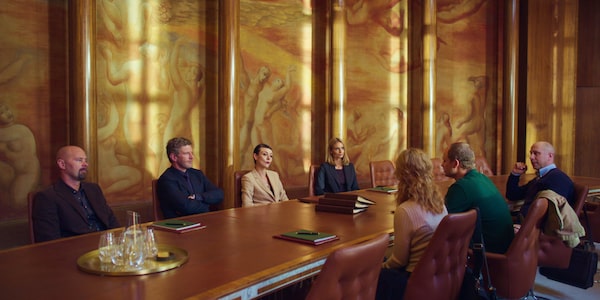
Edvin Endre stars as Daniel Ek in Netflix's The Playlist.Jonas Alarik/Netflix
In the early 2000s, when illegal downloading sites were causing music industry chaos, Swedish software engineer Daniel Ek pitched the concept of Spotify to dubious record company executives, telling them he had come up with a business model that “works.”
In the sharp new Netflix miniseries The Playlist, the fictionalized origin story of the music streaming service shows Swedish music executive Per Sundin (played by Beartown’s Ulf Stenberg) plunking a coin into a vintage Wurlitzer. As Joe Tex’s I Gotcha plays, Sundin grasps the attractive idea: “An infinite digital jukebox,” he murmurs. Which sounds good – maybe too good to be true.
Today, Spotify is more or less the industry standard. But with a minuscule subscription fee (Canadians pay Spotify $9.99 a month for unlimited ad-free music), it remains to be seen whether the company can turn a profit. This summer the Stockholm-based streamer announced that despite its 433 million users it had lost nearly US$200-million over the preceding quarter. And last week, after TikTok parent ByteDance revealed plans to front a global streaming service expansion, Spotify’s stock hit a record low.
Music consumers don’t give a flying Cardi B whether Spotify turns a profit. What they should care about, however, is how streaming services have altered the music world’s ecosystem, for better and for worse.
At the beginning of The Playlist, Ek tells a story about how “damn expensive” CDs were when he was a kid, and how the record store clerk gave him a dirty look when he paid for an Aretha Franklin album with a pile of coins he’d saved up. “I remember thinking that no one should have that kind of power over our music,” Ek says. “I knew that one day things would be different, because everything would be digital.”
Okay, The Playlist engages in a little mythologizing there. But it is true enough that power in the music industry is now less centralized, with music accessible at a utopian level compared to what existed in the 20th century. Record store chains are extinct, the taste-making days of music video channels MTV and MuchMusic are long over, radio has lost its sway and anyone who pays to own music any longer is either a nostalgist or a grassroots patron of the arts.
In short, the traditional gatekeepers have lost control of the turnstiles. But at what cost?
The obvious ramification of streaming services is that recording artists are being paid less than they were in the boom times of compact discs. The flip side argument is that with cheaper music more widely available than ever, bigger audiences will buy more artist merchandise and concert tickets.

Jason Baughan, left, Patrick Baladi, Severija Janusauskaité, Malin Barr, Gizem Erdogan, Endre and Erik Norén star in the Netflix miniseries.Netflix
That model fell apart when the COVID-19 pandemic caused a multiyear live music lockdown from which the industry has yet to recover. Now back on the road, musicians are finding that touring is a money-losing proposition because of inflation, specifically skyrocketing shipping and transportation costs. Some artists are cancelling tours altogether.
“Preparing for this tour we were looking at an economic reality that simply does not work and is not sustainable,” the American experimental pop band Animal Collective said on social media recently. Singer-songwriter Santigold expressed similar concerns in her own statement.
It’s possible the current touring issues are temporary. What is institutionally long term is the effect of streaming on the industry’s star-making machine. Listeners are being fire-hosed with new music, resulting in more songs but fewer hits. Without the curation of radio and record labels, it is more difficult for new artists to stand out in an increasingly crowded field.
It’s an issue that comes down to the accessibility of culture and who pays for it. The Playlist presents multiple views, including the intense ideological motivations of Peter Sunde, the co-creator of the Swedish file-sharing website the Pirate Bay. In 2009, he and two other founders were found guilty of assisting in copyright infringement.
“Can you guess who the heroes of this story are?” Sunde asks at a news conference. “And can you guess who the idiots of this story are?”
It is not that simple.
Plan your screen time with the weekly What to Watch newsletter. Sign up today.